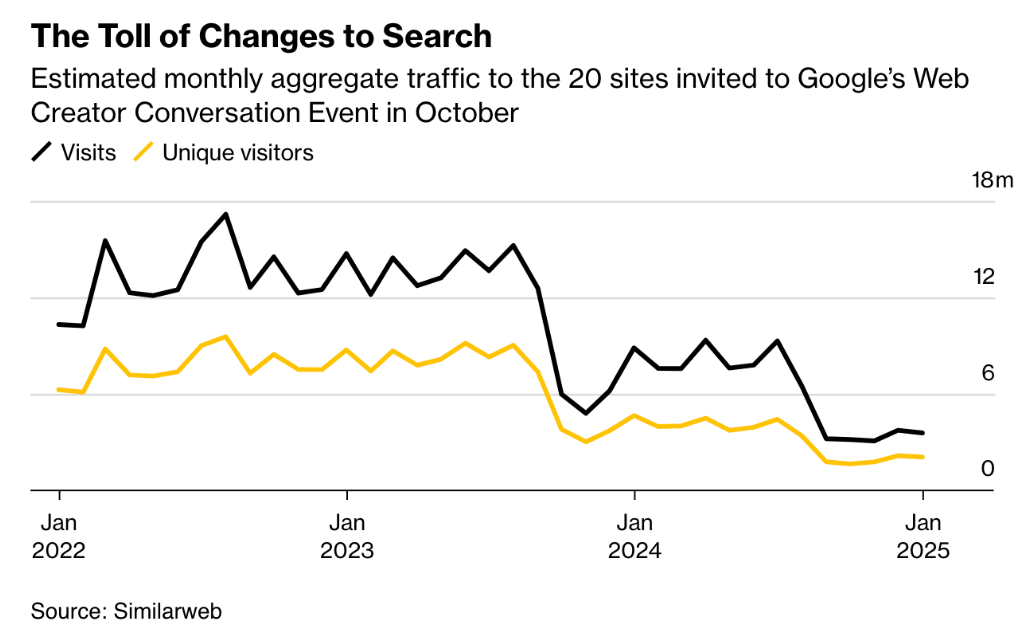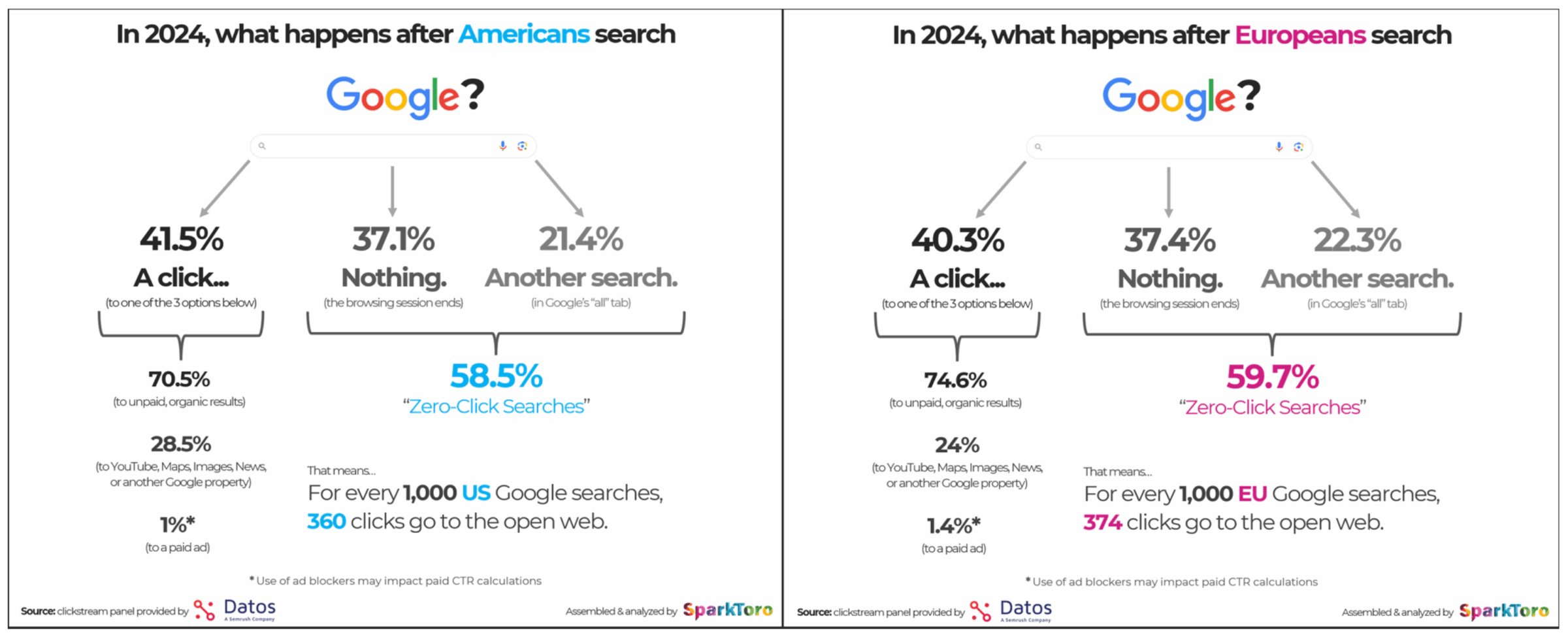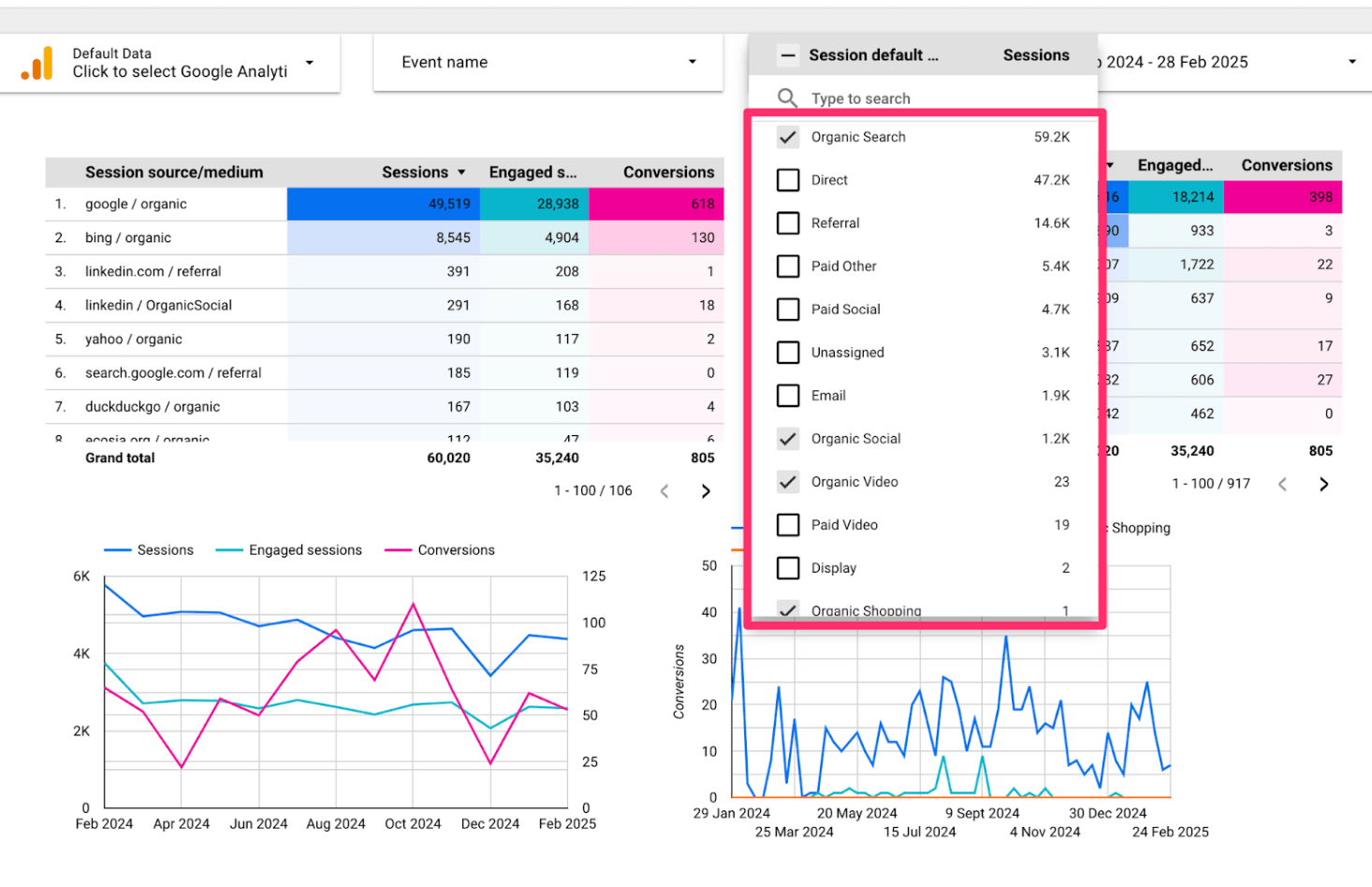Navigating the era of AI-powered search
For over two decades, search has revolved around one core assumption: that people begin and end their journeys on Google. But recently, a new search ecosystem is emerging – more fragmented, dynamic, and profoundly disrupted by AI.
We’ve entered the era of the answer engine – where generative engines, zero-click behaviour, and the rise of non-traditional discovery platforms are rendering yesterday’s SEO playbook obsolete.
Google’s AI gamble: the end of ten blue links
Google’s leadership once shied away from altering the core design of its search engine. In 2021, the internal proposal to add a chatbot to the search results page was dismissed. The concern? It would risk cannibalising Google’s ad revenue and undermine the mechanics of a model that delivered over $198 billion in revenue in 2024.
Fast-forward to 2025, and the shift is now unavoidable.
Following OpenAI’s explosive rise – powered, ironically, by technology Google pioneered in 2017 – the search giant has been forced to act. Under Elizabeth Reid’s leadership, Google has launched AI Overviews, which now dominate the most visible space on most informational SERPs, and are piloting a new “AI Mode”, a dedicated conversational search interface that challenges the traditional notion of search altogether.
Google doesn’t see this as a reset, but as a “constant evolution.” However, the impact on brands and publishers is anything but neutral. Indeed, a recent study of 20 publishers found that traffic has more than halved since Google rolled out AI overviews in 2024.

One publisher, who was recently invited to a Google publisher summit, was quoted as saying: “Something they told us in that meeting was to never expect to go back to our old levels of traffic… because search has now fundamentally changed.”
AI Overviews and the new reality of zero-click search
According to recent reports, over 14% of queries now trigger AI-generated summaries, allowing users to get answers without ever clicking through. At the same time, more than half of all SERPs display nine or more ads, further squeezing organic visibility.
What this means is that fewer searches are turning into clicks. Today, approximately 60% of Google searches are classified as “zero click” – meaning they won’t drive traffic away from Google itself.

This has two clear consequences:
- Click-throughs are no longer a reliable measure of search success.
- Content visibility is increasingly decoupled from website ownership.
Google’s AI is now surfacing “remixed” answers based on publisher content – in some cases, rephrasing entire sections without passing on the traffic, which is putting growing tension on the relationship between Google and publishers.
Beyond Google: why total search matters
Aside from the impact of AI, search behaviour is diversifying, particularly among younger demographics like Gen Z, who are increasingly turning to platforms like TikTok, Pinterest, and Reddit for information discovery.
Recent studies show that nearly 40% of Gen Z users prefer platforms like TikTok or Instagram over Google for searches.

This shift highlights the need for brands to embrace a total Search strategy – an approach that optimises not just for Google, but for wherever intent manifests: from generative engines like ChatGPT and Perplexity, to social platforms.
What total search looks like in practice
- LLM Optimisation: Targeting high-authority citations that LLMs pull from. This includes Wikipedia, Reddit, trusted media outlets, and well-structured website content.
- Multi-Platform Search Strategy: From YouTube and Pinterest to TikTok and Amazon, content must be optimised for search behaviours, and ranking mechanics of each platform.
- Creator & UGC Strategy: As Google increasingly indexes Reddit and forums, brand advocates and real users play a central role in search visibility.
- Digital PR: Inclusion in reputable sources not only earns trust but increases the odds of being referenced in AI outputs.
Measurement in a post-click world
As Google shifts from being a gateway to being the destination itself, traditional SEO KPIs are eroding in value.
What replaces them?
- Share of Model – measuring how often your brand is cited or referenced in AI-generated answers.
- Platform Engagement – analysing performance within native analytics (YouTube, Pinterest, Google Search Console).
- Total Search Dashboards – building a unified view of brand visibility across all search environments, not just Google. At its simplest, you can create a Total Search view in GA4 by isolating traffic from individual discovery platforms into a consolidated report. That said, for deeper performance insights, native analytics tools within platforms like Pinterest tend to offer more actionable detail.

Final thoughts
Google is evolving, but the direction is clear. The search bar will become less central, replaced by voice, visual, and conversational interfaces. AI Overviews will continue to expand, and AI Mode will likely transition from testbed to a core pillar of Google search.
Success in this new landscape means more than traffic and rankings. It’s about relevance in the moments that matter- whether that’s a reference in a Reddit thread, a citation in a ChatGPT response, or increased visibility on social media.
A holistic approach to search is the only viable strategy for brands that want to remain discoverable in a fragmented, AI-enhanced world. Those who continue to think in terms of blue links and keyword density will be left behind.
At Hallam, we are helping brands build resilient visibility across this new ecosystem – beyond Google, beyond SEO, and into every space where modern customers search, explore, and decide.
The post Navigating the era of AI-powered search appeared first on Hallam.

